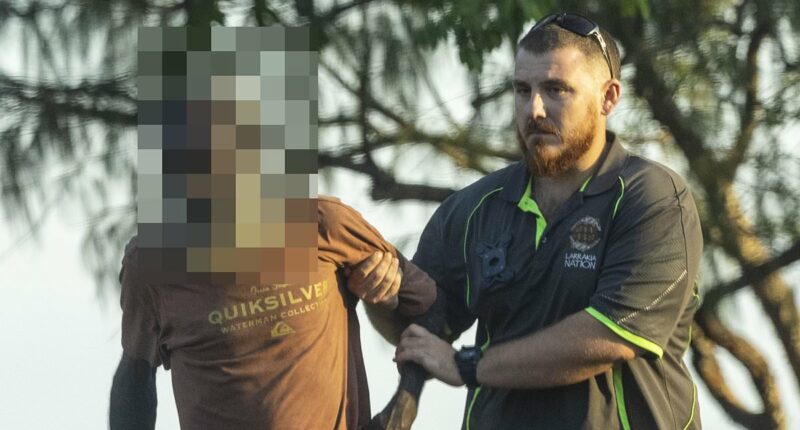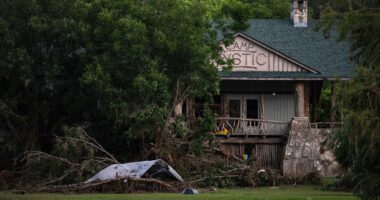Share this @internewscast.com
This is the season when the elite from Sydney and Melbourne travel to Darwin, Australia’s thriving northern city, for its renowned horseracing festival, esteemed Aboriginal art event, and this year’s headline-grabbing lawyer’s affair involving Netflix star Matt Wright.
In contrast, Thompson Nganjmirra, age 76, finds himself in a central Darwin park. He anxiously regards an impending storm and worries if he will have to endure a night out in the rain.
Thompson shares with the Daily Mail that he is among Darwin’s ‘long-grassers,’ the term locals use for the homeless community. They earned this nickname because they once sought refuge and sought alms in the tall spear grasses surrounding the city.
In Civic Park, located a short distance from the Northern Territory Parliament and Supreme Court, Thompson is without a consistent place to rest or even a blanket for comfort.
He has been caught short in the rain before.
Darwin represents a city of contrasts. In many ways, it is thriving. Property values have climbed, and rental costs are steep. The warm, dry summer draws many visitors from outside the region, creating a festive atmosphere.
Yet, the Northern Territory holds a homelessness rate that is twelve times higher than the national average. Ninety percent of Darwin’s homeless population is Indigenous, with many finding shelter in the city’s parks and surrounding greenery.
‘Sometimes it’s hard to get enough to eat,’ Thompson admits.

Thompson Nganjmirra, 76, is one of Darwin’s ‘long-grassers’ – the local term for homeless Indigenous people who live in the northern city which is undergoing a property boom and annual influx of the rich from interstate

A civilian patrol officer from the Larrakia Nation group takes a man away from East Point reserve in Darwin as family groups of Indigenous people watched the sun set

Khaki-clad members of PORU – the Public Order Response Unit – are seen on patrol, above

The other side of Darwin: Racegoers celebrate the Darwin Cup and show off their spectacular fashions
The Daily Mail spent four days recently reporting from Darwin and speaking to the locals – and learned that much has changed in the city over the past six years.
That was when Darwin’s politicians and civic leaders turned to private security firms to patrol areas of Darwin’s CBD and suburbs during the day and night – including the khaki-clad Public Order Response Unit, or PORU, focused on the suburbs; and the ‘blue shirts’ of Territory Protective Services, who patrol the city’s CBD.
Also on patrol is Larrakia Nation, a service run by the peak group of the local traditional Aboriginal landowners. The group aims to prevent alcohol-related disputes and resolve problems and conflicts.
Thompson shrugs his shoulders at the mention of the ‘blue shirts’, who, locals said, often wake sleeping people in the night to move them on.
‘Some are good, some bad,’ Thompson said. ‘They tell us we can go here, but not there. It’s okay if you have a place to sleep.’
He breaks into his native language, Kunwinjku, to speak to his niece, 54-year-old Lillian Yulidji, who is sheltered with her uncle and other relatives under a large park tree.
‘Blackfellas are used to them (the blue shirts) now,’ Thompson said.
A spokesman for the so-called ‘blue shirt’ company, TPS, said it had been contracted by the NT Police to maintain public order for six years and did not condone violence or ill-treatment of Darwin residents.

The Indigenous man is escorted to a waiting vehicle and assisted into a containment unit at the back

Thompson Nganjmirra, 76, and his niece Lillian Yulidji, 54, have lived on-and-off in Darwin’s CBD for years, often sleeping rough and having to rely on soup kitchens for food
With Darwin’s peak tourist season underway – the art fair lasting four days, attracting buyers from Sydney and Melbourne’s elite, and the Darwin Cup running at the Darwin Turf Club at Fannie Bay – both PORU and Larrakia Nation were patrolling the shores of Lake Alexander, at East Point Park.
When the Mail visited on an afternoon late last week, Aboriginal family groups were gathered together while white people jogged and exercised along the boardwalks.
Sitting amid council signs warning ‘no camping or sleeping overnight’, the families sat watching the sun sink over the water. Some of the group were drinking.
Officers from PORU and Larrakia spoke with them. They dragged one old man off into a van which had a containment unit at its rear, much like a police paddy wagon.
Political debate erupts
The treatment of the city’s homeless population and the government’s crime policies are a hot political debate.
Darwin mayoral candidate Leah Potter, who is campaigning on an ‘end homelessness’ ticket at this month’s council election, told the Mail ‘it is not a crime to homeless’.
Potter was furious about plans by the NT government to further expand its law enforcement forces.
The government wants to arm transit and public housing safety officers – who currently patrol buses, supermarkets and public housing – with firearms as part of a crime reform package. The new police auxiliaries will be on the streets by 2026.
‘You can just imagine how that will play out,’ she said. ‘It is not a crime to be homeless, but what could possibly go wrong?’

Darwin mayoral candidate Leah Potter, who is campaigning on an end homelessness ticket at this month’s council election, told the Mail ‘it is not a crime to homeless’
Meanwhile, the NT Government has just issued a new Bus Dress Code policy, placing signs on buses advising passengers with ‘dirty or stained clothes’ will be refused travel.
‘This is clearly aimed at Indigenous people, the homeless and the mentally ill,’ Potter claimed.
‘When you have no roof or running water, or access to laundry facilities, meeting these so-called ‘standards’ is impossible. So, they’re punished for poverty.’
The Northern Territory Department of Logistics and Infrastructure told the Daily Mail that its Rules of Travel, displayed on all buses, ‘ensure a safe and respectful environment for everyone using public transport’.
A spokesman said that under those rules, ‘a passenger could be asked to leave a bus if they are wearing soiled clothing that may leave dirt, grease, bodily fluids or damage a seat which could be used by another passenger’.
They said that drivers or transit officers could ‘exercise discretion and ask a person not to board the bus’.
However, ‘it is extremely rare for someone to be refused entry due to hygiene.’
Potter, who runs the Sunset Soup Kitchen in Darwin, is on personal terms with most of the 200 Indigenous rough sleepers who populate the inner city, some of them regularly setting up camp in her street.
She is a Territorian by birth, with a rollercoaster history living in Sydney and Melbourne.
‘I am campaigning to change the shame, disempowerment and other factors contributing to homelessness,’ she said, ‘which is inequality, education, health, joblessness, imprisonment, violence against women.
‘Aboriginal women are killed in alarming numbers. They are more than 10 to 12 times more likely to be victimised, assaulted and murdered than any other group of women.’
But she admits she is unlikely to win against the twelve other candidates, and that her Roadmap Out of Homelessness ‘is a really hard sell to Territorians’.
‘It’s about dignity and respect. You’ve got 40kg blackfellas about to die of chronic disease. They are human beings,’ she said.
‘But instead the NT Government wants to focus on fining people for breaking the law because sleeping in public parks is illegal.’

Rich art buyers from interstate flocked to the NT capital this week for the prestigious annual Darwin Aboriginal Art Fair, a festival of Indigenous culture(pictured, a fashion parade at the 2022 fair)
Although, even at this time of year the daytime temperature in Darwin is a steady 31 degrees, it can drop to 17 overnight, a shivering prospect under a wet tree.
Darwin’s shelters always fill up fast, especially on rainy nights, and places like Spin Dry out at Berrimah are too far to walk.
‘The cost of living crisis has pushed even more people onto the streets of Darwin, and the bus dress policy will mean getting access to food, health care, Centrelink and even family will be more difficult,’ Potter said.
‘To be excluded from a public service simply because of the clothing you’re wearing is appalling.’
As for Thompson and his niece Lillian, thankfully, they have found an ‘uncle’ who can house them for at least one night, and that means they will get a feed.
Thompson has been coming to Darwin on-and-off from Oenpelli, a mission bordering Kakadu National Park in West Arnhem Land, for 25 years, and Lillian for ‘a long time’.
They are considering a return to their country.
‘Might go back for Christmas, it’s really good back there,’ he said.

















